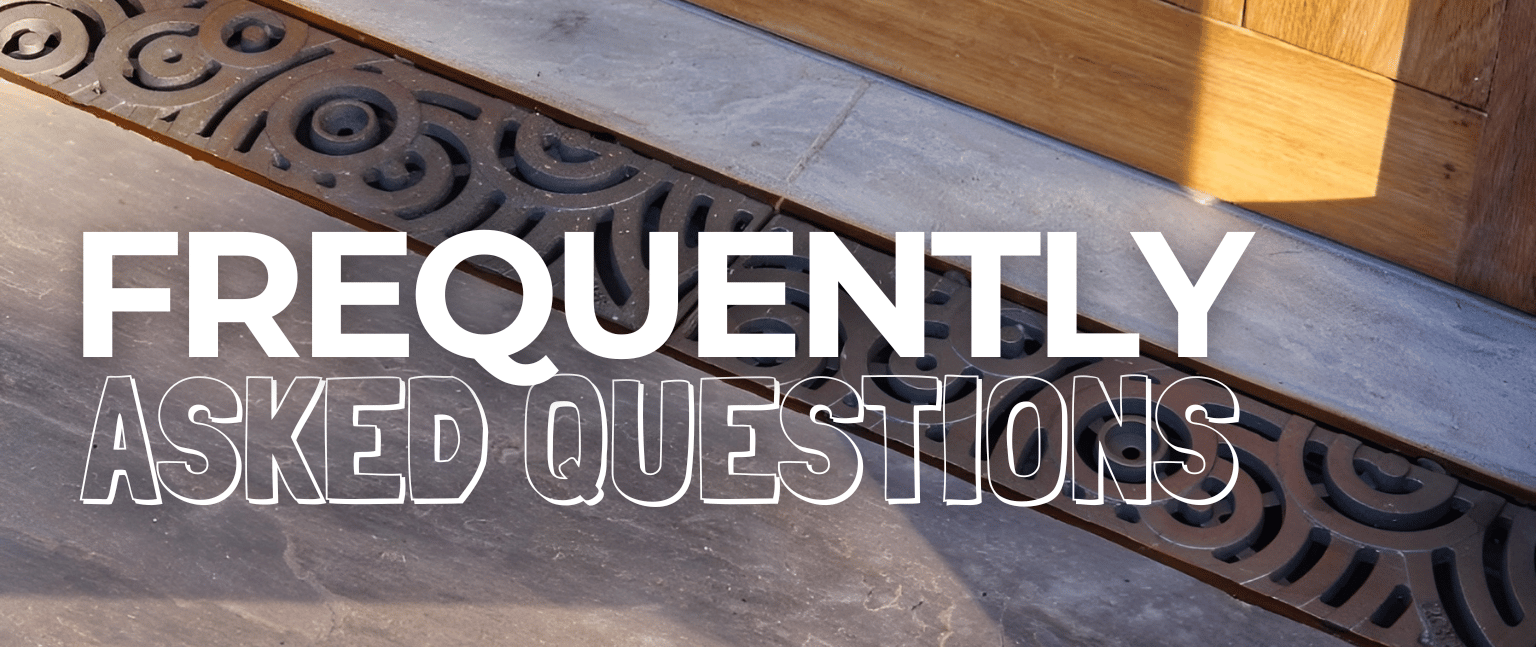
Frequently Asked Questions
What is the open area or free drain area of the drain cover?
This depends on the design chosen and is expressed as a percentage. Please see a list below of the free drain area for a selection of Iron Age grates. If the grate you are looking for is not listed, please contact us on 020 8450 2244 or email info@lateraldesignstudio.co.uk.
How many litres per minute can the drain handle?
This depends upon the free drain area but, is calculated by this formula:
Free Drain Area (in square inches) X 1.31 = GPM (gallons per minute)
Free Drain Area (in square inches) X 1.31 = GPM (gallons per minute)
Can you cast grates on a radius (circles and ovals)?
Yes. We can make any radius you would like for both our standard size products, as well as a completely bespoke product.
Circles only require one pattern that goes around the entire length. Ovals have a changing radius and may require multiple patterns. A large enough circle or oval, however, may not require any original pattern at all because the radius change at any connection is very slight.
Circles only require one pattern that goes around the entire length. Ovals have a changing radius and may require multiple patterns. A large enough circle or oval, however, may not require any original pattern at all because the radius change at any connection is very slight.
What other materials can be cast?
In addition to raw cast iron, our products can be cast in aluminium, ductile, and silicone bronze. Bronze is best for use near salt water or for fountains.
Why are there different material costs?
The cost for ductile and aluminium is far greater than cast iron. Bronze is the most expensive. Price depends on the weight of the casting and each is slightly different, so it always best to call us on 0208 450 2244 or email info@lateraldesignstudio.co.uk for a quote.
What are Heel Proof grates?
A Heel Proof grate is different than a standard grating as the apertures are smaller to help prevent public falls and injuries.
Heel Proof is sometimes referred to as “Drain Proof” because smaller the holes are much more likely to clog than standard grates.
Heel Proof is sometimes referred to as “Drain Proof” because smaller the holes are much more likely to clog than standard grates.
Are our cast iron products load class tested?
Yes, the relevant load classification will be shown on the product information pages, and typically range from A15 to D400. For load class requirements please contact us on 0208 450 2244 or email info@lateraldesignstudio.co.uk.
Do you offer bespoke patterns?
We can tailor a pattern to anything you like, including your own designs. For an estimate and to discuss the options available, please contact us on 0208 450 2244 or email info@lateraldesignstudio.co.uk.
Do you provide frames for the gratings?
Bespoke gratings, especially those of a standard size such a radius grates and tree grates, require a frame. We can fabricate a frame to suit different applications and load classes in a range of materials, such as galvanised and stainless steel.
Can I use a major manufacturers drain body for a radius trench channel?
No. Bespoke sized gratings will require a custom frame and most manufacturers do not make channels on a radius.
Will my grates rust?
Yes. Cast iron goes through a process of oxidation, more commonly known as rust. This oxidation process creates a tightly adhering iron oxide coating known as the Passivation layer. The Passivation Layer protects the bulk iron from further oxidation. In other words, once the Passivation layer is created the oxidation slows dramatically and the iron remains intact for a very long time.
This Passivation layer is often referred to as a patina. Many metals create a patina, the green patina that forms naturally on copper and bronze is known as verdigris and consists of copper carbonate. Think of the Statue of Liberty’s green colour. The patina on cast iron is more chocolate brown in colour.
The oxidation process begins on contact with water and goes through an evolution of passivation or patination. First the iron turns bright orange for a few months then will slowly turn chocolate brown in colour. Over time, perhaps a year depending upon the environment, they will look like every other cast iron manhole cover or drain grate that you see in the street.
When traffic wears on iron, the finish can take on a burnished look. Think of manhole covers you see in high traffic areas. Unlike steel the cast Iron will not flake away. The navy has made ship anchors out of cast iron, which can last for decades in a raw state. Most of the casting you see in the street such as manhole covers are made of cast iron and are very durable.
This Passivation layer is often referred to as a patina. Many metals create a patina, the green patina that forms naturally on copper and bronze is known as verdigris and consists of copper carbonate. Think of the Statue of Liberty’s green colour. The patina on cast iron is more chocolate brown in colour.
The oxidation process begins on contact with water and goes through an evolution of passivation or patination. First the iron turns bright orange for a few months then will slowly turn chocolate brown in colour. Over time, perhaps a year depending upon the environment, they will look like every other cast iron manhole cover or drain grate that you see in the street.
When traffic wears on iron, the finish can take on a burnished look. Think of manhole covers you see in high traffic areas. Unlike steel the cast Iron will not flake away. The navy has made ship anchors out of cast iron, which can last for decades in a raw state. Most of the casting you see in the street such as manhole covers are made of cast iron and are very durable.
Will the grates rust away to nothing?
No. Cast Iron creates a patina of rust which acts as a protective coat. The grates will last for decades.
Will rust stain the surrounding area?
If a drain is working properly any rust particles will flow down the drain with the water. The drain channels have plastic, metallic, or polymer edges along the top edge that prevents the iron grates from directly touching the surrounding surface. Think of the manhole covers on the street, there aren’t rust stains surrounding them.
Is rust a problem around a pool?
No. Cast iron can handle the PH balance in pool water better than aluminum, which, over time, will deteriorate.
Can the grates be screwed down?
Yes. All the grates have been designed to include a bolt hole, which gives you the option to fix the gratings to the channel with security fixings. In many residential cases, screwing down the grate cover is not necessary.
Can the grates be sealed, painted or powder coated?
Yes. We can apply a range of different finishes to the gratings. Contact us on 0208 450 2244 or email info@lateraldesignstudio.co.uk to find out what options we can provide.


